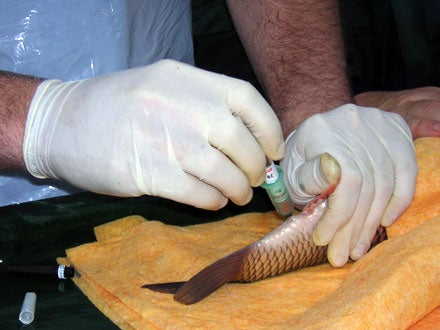| Over the last 10 years there has been growing concern about unexplained large-scale carp only mortalities, which generally occur in spring in fisheries throughout England and Wales. These mortalities have become known as Spring Carp Mortality Syndrome (SCMS). As part of the ongoing research project into SCMS all three organisations involved would like to ask for the angling communities help in allowing the further progression of the project by reporting any carp only fish deaths on fisheries in England and Wales.
To date the specific cause of SCMS mortalities has yet to be identified, although via past and present research, it is suspected that an infectious agent of some form may be involved. The current project is developing molecular DNA tests to identify known fish virus families that will be used to investigate SCMS events, from both historic and future occurrences. This will hopefully allow the causative agent to be identified as being part of one of these distinct virus families or indicating that it is a novel agent. It is with this in mind that all three organisations are asking the entire angling community to assist them by the reporting of large-scale carp only mortalities they encounter on fisheries around England and Wales during the coming months. In simple terms the more ‘fresh’ samples that can be collected gives the project a better chance of providing an answer to this potentially devastating syndrome. As part of the Environment Agency’s normal monitoring of fish mortalities in the wild, the Agency will be placing particular emphasis on potential SCMS cases this year to support the ongoing work. CEFAS, the EA and ECHO therefore actively encourage all anglers and fishery managers alike to report any such ongoing carp deaths, or cases of dead / distressed fish no matter what species, to the EA on 0800 80 70 60. All calls will be treated in strictest confidence. Viv Shears, ECHO Vice Chairman and ECHO Research Fund Manager said Ruth Lockwood, ECHO Chair said Kevin Denham, Senior Fish Health Inspector, CEFAS said Steve Maidment, Investigations Inspector, CEFAS said Jane Snow, Fisheries Scientist, Environment Agency said “The impact of SCMS outbreaks can be devastating to carp populations. As well as the loss of valued fish this can have a severe economic impact on the affected fisheries. The Environment Agency therefore asks that anyone suspecting a problem on a water they fish should inform the Agency, CEFAS or ECHO. Each investigation adds to the knowledge we are jointly developing to help fight this threat to our fisheries.” Jim Glasspool, Chairman of the Fisheries and Angling Conservation Trust, said, NOTES Development of these tests has progressed well to date and the next step is to use samples collected from SCMS events to see if any viruses can be isolated. Both the EA and CEFAS have historical samples from SCMS cases but these are relatively difficult to work with due to various reasons. Although funded to investigate SCMS the tests being developed are not solely aimed at identifying carp specific viruses so their development is hoped to benefit the wider coarse fish population as a whole. The Environment Agency has a duty to maintain, improve and develop inland fisheries. The Agency regards investigating fish disease outbreaks and providing advice to fisheries managers to prevent repeat problems as being a significant aspect of this duty. Fishery owners, under the Diseases of Fish act 1937 as amended, have a legal duty to report any suspicion of a notifiable disease outbreak to DEFRA (through the CEFAS Fish Health Inspectorate). By notifying the Environment Agency they will fulfil this duty, as the information will be forwarded by the Agency. Recommendations -Avoid stocking carp to waters that already hold an established carp population. Over half of the studied SCMS cases had received a recent introduction of new fish. If possible increase the natural productivity and improve the habitat of the water to promote natural recruitment. -Disinfect all equipment that comes into contact with the water. Iodophor based disinfectants are effective if used correctly. Carefully drying fishing tackle, nets, etc. and exposing to direct sunlight also has a sterilising effect. -If a mortality incident occurs stop fishing. This will reduce the stress on the fish and allow the immune system the best chance of fighting the disease. This action would also reduce the risk of spreading an infectious agent to other waters. -Talk to your local Environment Agency Fisheries Officer. They are able to provide advice and help |
Welcome!Log into your account











